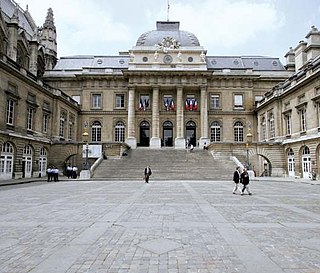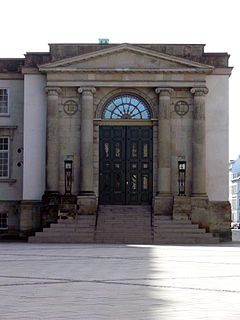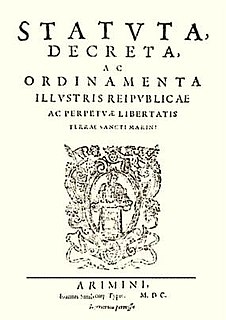
San Marino, officially the Republic of San Marino, also known as the Most Serene Republic of San Marino, is a microstate in Southern Europe completely enclosed by Italy.

The politics of the state of San Marino takes place in a framework of a unitary assembly-independent representative democratic republic, whereby the Captains Regent are the heads of state and heads of government. The country has a multi-party system. Executive power is exercised by the government. Legislative power is vested in both the government and the Grand and General Council. The judiciary is independent of the executive and the legislature.

A county court is a court based in or with a jurisdiction covering one or more counties, which are administrative divisions within a country, not to be confused with the medieval system of county courts held by the high sheriff of each county.

The Court of Cassation is one of the four courts of last resort in France. It has jurisdiction over all civil and criminal matters triable in the judicial system, and is the supreme court of appeal in these cases. It has jurisdiction to review the law, and to certify questions of law, to determine miscarriages of justice. The Court is located in the Palace of Justice in Paris.
An ecclesiastical court, also called court Christian or court spiritual, is any of certain courts having jurisdiction mainly in spiritual or religious matters. In the Middle Ages these courts had much wider powers in many areas of Europe than before the development of nation states. They were experts in interpreting canon law, a basis of which was the Corpus Juris Civilis of Justinian which is considered the source of the civil law legal tradition.

The Courts of Denmark is the ordinary court system of the Kingdom of Denmark. The Courts of Denmark as an organizational entity was created with the Police and Judiciary Reform Act taking effect 1 January 2007 which also significantly reformed the court system e.g. by removing original jurisdiction from the High Courts and by introducing a new jury system.

The Court of Audit is the national French administrative court charged with conducting financial and legislative audits of most public institutions and some private institutions, including the central Government, national public corporations, social security agencies, and public services. The Court is essentially a cross between a court of exchequer, comptroller general's office, and auditor general's office in common-law countries.

In France, career judges are considered civil servants exercising one of the sovereign powers of the state, so French citizens are eligible for judgeship, but not citizens of the other EU countries. France's independent court system enjoys special statutory protection from the executive branch. Procedures for the appointment, promotion, and removal of judges vary depending on whether it is for the ordinary or administrative stream. Judicial appointments in the judicial stream must be approved by a special panel, the High Council of the Judiciary. Once appointed, career judges serve for life and cannot be removed without specific disciplinary proceedings conducted before the Council with due process.
The Alaska Court System is the unified, centrally administered, and totally state-funded judicial system for the state of Alaska. The Alaska District Courts are the primary misdemeanor trial courts, the Alaska Superior Courts are the primary felony trial courts, and the Alaska Supreme Court and the Alaska Court of Appeals are the primary appellate courts. The chief justice of the Alaska Supreme Court is the administrative head of the Alaska Court System.

The Constitution of the Republic of San Marino is distributed over a number of legislative instruments of which the most significant are the Statutes of 1600 and the Declaration of Citizen Rights of 1974 as amended in 2002. The constitutional system has influences from the Corpus Juris Civilis and Roman customary law. It may have the oldest surviving constitution of any sovereign state in the world.

The Supreme Court of Korea is the highest court in South Korea. It is located in Seoul. Articles 101–110 of the Constitution of the Republic of Korea establish the Supreme Court and enumerate its powers and responsibilities. Although the Supreme Court is the highest court for most legal issues, the Constitutional Court of Korea is the court of last resort for more specialized constitutional issues such as impeaching presidents or dissolving political parties.

The Supreme Court of the Russian Federation is a court within the judiciary of Russia and the court of last resort in Russian administrative law, civil law and criminal law cases. It also supervises the work of lower courts. Its predecessor is the Supreme Court of the Soviet Union.

The judiciary of Colombia is a branch of the State of Colombia that interprets and applies the laws of Colombia, to ensure equal justice under law, and to provide a mechanism for dispute resolution. The judiciary comprises a hierarchical system of courts presided over by judges, magistrates and other adjudicators.

The Superior Court of California, County of Los Angeles, is the California superior court with jurisdiction over Los Angeles County, which includes the city of Los Angeles. It is the largest single unified trial court in the United States.
English common law forms the basis of the Bahamas’ judicial system.

The district courts of Sweden are the court of first instance for the general courts in Sweden. The next instance are the courts of appeal. The district court handle criminal cases, some civil law disputes and a number of non-contentious matters. There are 48 district courts across Sweden, and the catchment area is based on the geographic boundaries of several municipalities. The number of employees vary, from ten to several hundreds.
The administrative courts of appeal in Sweden is the second tier for the general administrative courts in Sweden. The next and final instance is the Supreme Administrative Court. There are four administrative courts of appeal, and they mostly handle cases and other judicial issues that have already been dealt with by the lower courts. In addition to this, they also act as court of first instance in cases related to the principle of public access to official records.

The judiciary is one of the three branches of state that make up the government of the Dominican Republic. Its function is to administer justice, for free, to decide on disputes between individuals or corporations, private or public, in every type of process, judgment and execution of judgment. They exercise for the courts and tribunals established by the Constitution and the law

The Guarantors' Panel on the Constitutionality of Rules is the highest court of San Marino in matters of constitutional law. The institution was established with Constitutional Revising Law no. 36 of 26 February 2002, which has amended Article 16 of the "Declaration on the Citizens' Rights and Fundamental Principles of San Marino Constitutional Order". The Guarantors' Panel on the Constitutionality of Rules is the youngest body of San Marino constitutional order. Constitutionality review was previously entrusted to the Great and General Council, but throughout the years this solution had presented several limits.
The Judiciary of the Philippines consists of the Supreme Court, which is established in the Constitution, and three levels of lower courts, which are established through law by the Congress of the Philippines. The Supreme Court has expansive powers, able to overrule political and administrative decisions, and with the ability to craft rules and law without precedent. It further determines the rules of procedure for lower courts, and its members sit on electoral tribunals.














